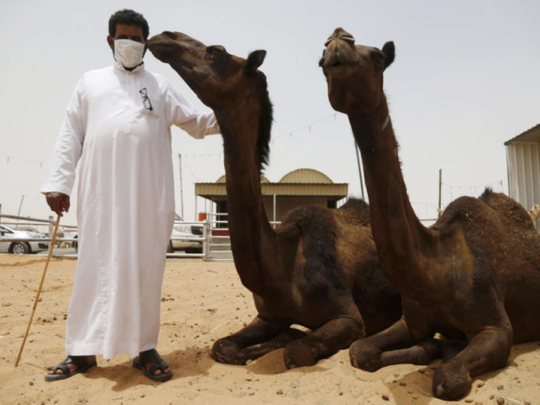
Manama: Saudi Arabia’s agriculture minister said that he was completely endorsing the health ministry’s warning against close contacts with camels, despite pressure from camel owners.
As part of a prevention campaign of the deadly Middle East Respiratory Syndrome (Corona-Mers), the health ministry had urged people to wear masks and gloves when dealing with camels and to stay away from raw camel meat and from camel milk, and not to go near sick animals. Recent studies have linked the spread of the virus to the desert animal.
However, in a blatant challenge to the conclusions that the virus was “extraordinarily common” in camels and to the ministry instructions, camel owners, known for their strong historical attachment to their animals, have been posting pictures and video clips of themselves kissing the humped quadrupeds and assuring everyone that they were never a source of health hazard.
“We had expected the reaction of camel owners, and we had similar experiences with bird owners at the time of the bird flu,” Fahd Balghunaim, the agriculture minister, said.
“The agriculture ministry’s main concern is the good health of the citizens and we take our actions accordingly, even when there is the slightest doubt [about a possible hazard] and regardless of reactions. We work closely and in full coordination with the health ministry in confronting the Coronavirus and we do remain open to all views and opinions,” he said in remarks carried by local daily Al Sharq on Thursday.
At a meeting with members of the Consultative Council on Wednesday, Acting Health Minister Adel Faqih stressed the ministry’s warnings about camels were based on scientific studies, including one by the ministry itself.
The minister said that 64 per cent of those who had the virus were Saudi nationals and the remaining 36 per cent were foreigners. He added that 28 per cent were medics.
Most of those who died were above 20 years and children represented the safest segment, he added.
According to the minister, 689 cases have been detected since the outbreak of the virus, resulting in 283 deaths.
The highest figure of deaths was recorded in April this year, while May saw a drop of around 80 per cent, he said.
Al Faqih said preventive measures and greater awareness among citizens and residents contributed largely to the drop in cases, but insisted that the health ministry would not reduce its mobilisation levels.
“We will remain vigilant, committed and careful and we do plan for all possible scenarios,” he said. “We have taken all precautions at the holy places [in Makkah and Madinah] and medical facilities are ready to deal with any case. We have not found any case among those who are performing Umrah despite their large numbers these days,” he said.
The minister said that teamwork was the best solution to address all situations.
“The ministry is open to all and the level of transparency is without limits so that we can update all people on the measures and steps taken. We are ready to listen to all views, particularly the scientific ones. We have enlisted the assistance of several competent people to benefit from their experience and we will not hesitate to ensure more help and competence to meet our needs,” he said.












